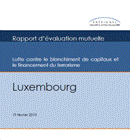This report summarises the anti-money laundering and counter-terrorist financing measures (AML/CFT) that were in place in Luxembourg at the time of the on-site visit (4-15 May 2009) and immediately thereafter. It describes and analyses these measures and offers recommendations on how to strengthen certain aspects of the system. It also assesses Luxembourg’s level of compliance with the 40+9 Recommendations of the Financial Action Task Force (FATF). See as well the table of ratings of compliance with the FATF Recommendations, below.
Key Findings
- Luxembourg is one of the most important financial centres in Europe and worldwide; it ranks second in the world for investment fund activities and is the most important centre for wealth management in the euro zone. Financial services occupy a very important place in the economy, accounting for around 25% of gross domestic product.
- The crime of money laundering is defined technically in a manner largely consistent with international standards. However, legal persons are not subject to criminal sanctions. Moreover, practical implementation of the offence is very ineffective, so that sanctions (the level of which is generally low) have been imposed in only eight cases since 2003. The criminalisation of terrorist financing does not cover all the elements called for by international standards and does not include the financing of individual terrorists or terrorist groups other than as related to the commission of terrorist acts. Finally, the notion of a terrorist group applies only to associations of more than two persons.
- The confiscation mechanism in place is relatively satisfactory, despite some limitations that reduce its scope, particularly regarding confiscation of property held by a third party. Provisional measures that may be implemented in this context are inadequate and confiscation cases are rare in terms of ML and relate to secondary instrumentalities (i.e. not cash or high value assets). Terrorist assets may be frozen by the Financial Intelligence Unit (FIU), but this measure is limited to three months and is conditional upon the filing of a suspicious transaction report (STR), which does not ensure timely freezing and applies only to financial assets. In general, the procedure for freezing terrorist assets is confusing and falls short of international standards.
- The FIU was created in 2004 within the office of the Public Prosecutor of Luxembourg (the Parquet). At the time of the on-site visit it comprised six persons responsible for operational tasks, an inadequate staffing level in light of the steadily rising number of STRs filed. The FIU is not bound by any “speciality rule” but has jurisdiction over all offences detected in STRs. Among the cases that it “disseminates”, few cite the crime of money laundering. Prosecution authorities also focus their efforts on the predicate offence; the number of laundering investigations is low (there had never been an investigation into terrorist financing at the time of the on-site visit).
- Luxembourg’s AML/CFT prevention mechanism is based on [European] Community instruments. It applies to the great majority of financial institutions that should be covered according to FATF rules, as well as designated non-financial businesses and professions (DNFBPs), and it has been extended to other professions. However, Luxembourg has not conducted an assessment of the ML/TFTF risks facing its financial institutions DNFBPs, and the approach adopted authorises, in many situations, an exemption from any due diligence measure.
- Financial sector supervisory authorities conduct few on-site AML/CFT inspections, and those inspections cover only accounts, to the exclusion of the AML/CFT policies and procedures implemented by institutions. Moreover, at the time of the on-site visit some categories of institutions had never undergone any form of inspection. The sanctions regime is unsatisfactory and in fact no penalty has ever been imposed in AML/CFT matters. Among the non-financial businesses and professions, only the legal and accounting professions are organised and supervised, and they have never been subjected to AML/CFT sanctions.
- Luxembourg has a system for registering legal persons, including non-profit organisations (NPOs). The register is readily accessible, including on-line, without charge. However, it does not reveal the beneficial owners. Some corporations can issue bearer shares; Luxembourg has not taken any steps to prevent their illicit use.
- When it comes to international co-operation, the powers of the authorities are the same as those in domestic matters. However, in most cases, dual criminality is required, and the capacity to co-operate is thus constrained by the gaps identified in the criminalisation of money laundering and terrorist financing.
The full report of the Mutual Evaluation of Luxembourg is available in French only.
This mutual evaluation was conducted using the FATF Recommendations as published in October 2004, and the 2004 Methodology for Assessing Compliance with the FATF 40 Recommendations and FATF 9 Special Recommendations.


 Twitter
Twitter
 Facebook
Facebook
 Instagram
Instagram
 Linkedin
Linkedin
